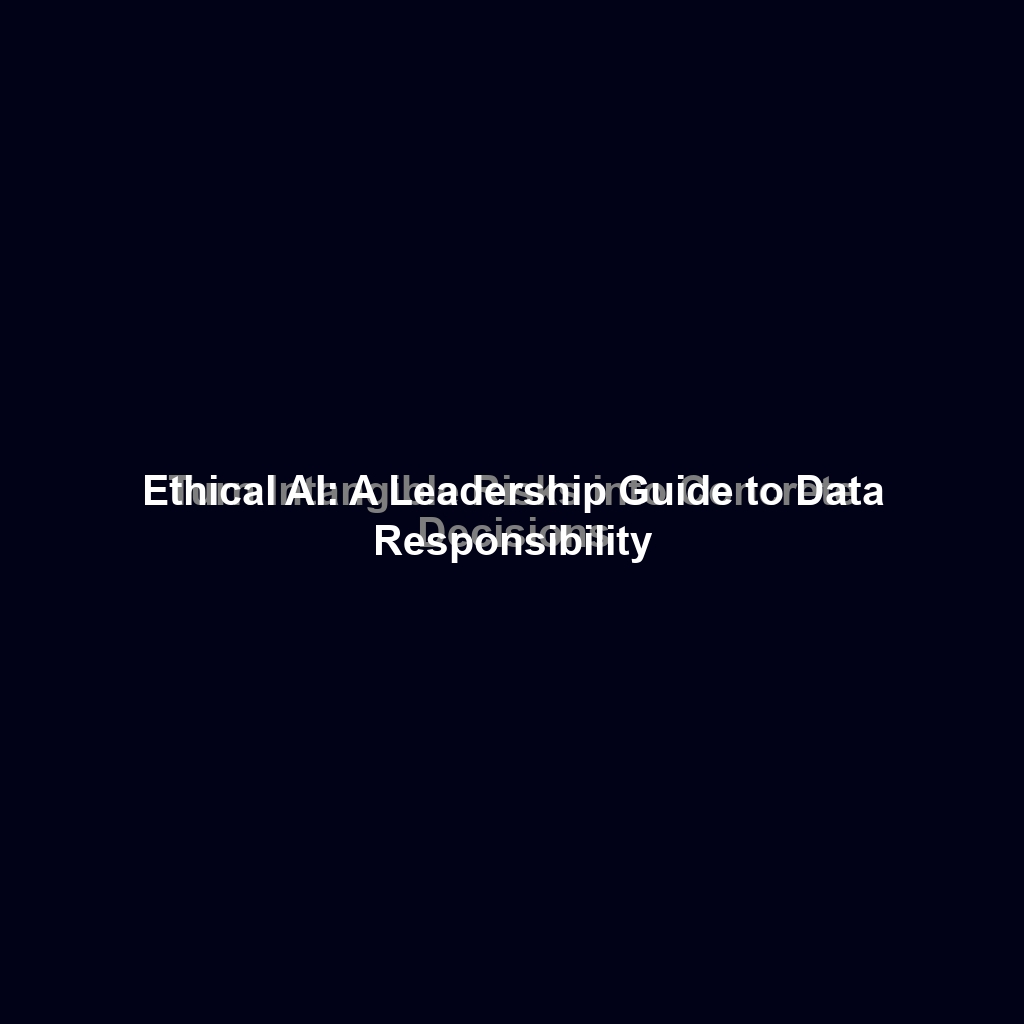In today’s rapidly evolving business landscape, data is king. Executive leadership increasingly relies on data-driven insights to inform strategy, optimize operations, and gain a competitive edge. However, with great power comes great responsibility. The ethical considerations surrounding data-driven decisions are paramount, requiring careful navigation to avoid bias, protect privacy, and ensure equitable outcomes. This guide explores the critical ethical challenges associated with data-driven decision-making and provides actionable guidance for executives to build robust ethical frameworks within their organizations.
Understanding the Ethical Landscape of Data-Driven Decisions
Data-driven decision-making offers immense potential, but it also presents a minefield of ethical dilemmas. These challenges stem from various sources, including inherent biases in data, the potential for privacy violations, and the risk of perpetuating or amplifying societal inequalities.
Bias in Algorithms: The Hidden Prejudice
Algorithms are only as good as the data they are trained on. If the data reflects existing societal biases – whether related to gender, race, socioeconomic status, or other protected characteristics – the algorithm will likely perpetuate and even amplify those biases. This can lead to discriminatory outcomes in areas such as hiring, lending, and even criminal justice.
Key Insight: Algorithmic bias isn’t always intentional, but its impact can be devastating. It’s crucial to proactively identify and mitigate bias throughout the data lifecycle.
Real-World Scenario: I once consulted with a fintech company developing an AI-powered loan application system. During testing, we discovered that the algorithm disproportionately rejected loan applications from women, even when their financial profiles were comparable to those of men who were approved. The root cause? The historical loan data used to train the algorithm reflected past lending practices that were biased against women. We had to retrain the algorithm using a more balanced dataset and implement fairness-aware techniques to mitigate the bias.
Practical Application: Regularly audit your algorithms for bias using fairness metrics like disparate impact and equal opportunity. Diversify your data sources and consider techniques like adversarial debiasing to mitigate bias during model training.
Data Privacy Concerns: Protecting Personal Information
Data privacy is a fundamental ethical principle. Individuals have a right to control how their personal information is collected, used, and shared. Data-driven decision-making often involves processing vast amounts of personal data, raising significant privacy concerns. Violations of privacy can erode trust, damage reputations, and lead to legal repercussions.
Example: The Cambridge Analytica scandal is a stark reminder of the potential consequences of data privacy breaches. The unauthorized collection and use of Facebook users’ data for political advertising not only violated users’ privacy but also undermined democratic processes.
Actionable Insight: Implement robust data privacy policies and procedures that comply with relevant regulations such as GDPR and CCPA. Obtain informed consent before collecting and using personal data. Anonymize or pseudonymize data whenever possible to reduce the risk of re-identification.
Discriminatory Outcomes: Unfair and Inequitable Results
Even when algorithms are not explicitly biased, data-driven decisions can still lead to discriminatory outcomes. This can occur when the data used to train the algorithm reflects existing societal inequalities or when the algorithm makes decisions that disproportionately impact certain groups.
Key Insight: Fairness is not simply about treating everyone the same. It’s about ensuring that everyone has an equal opportunity to succeed, regardless of their background or characteristics.
Experience-Based Insight: I worked with a retail company that used data analytics to optimize pricing strategies. While the overall strategy increased profits, it also resulted in higher prices for products commonly purchased by low-income communities. This, in effect, penalized those communities. We adjusted the strategy to offer targeted discounts and promotions in those areas to mitigate the unintended discriminatory impact.
Trustworthy Reference: Explore resources from the Electronic Frontier Foundation (EFF) on algorithmic accountability and fairness.
The Erosion of Human Judgment: Over-Reliance on Data
While data can provide valuable insights, it should not be seen as a substitute for human judgment. Over-reliance on data can lead to a neglect of qualitative factors, contextual understanding, and ethical considerations. It’s crucial to maintain a balance between data-driven insights and human expertise.
Anecdotal Evidence: I witnessed a situation where a hospital implemented an AI system to predict patient readmission rates. While the system was highly accurate, it also led to a decline in communication between doctors and patients, as doctors began to rely solely on the system’s predictions. This ultimately harmed patient care. The hospital eventually implemented a policy requiring doctors to engage in meaningful conversations with patients, regardless of the system’s predictions.
Building an Ethical Framework for Data-Driven Decision-Making
To navigate the ethical complexities of data-driven decision-making, executives must build a robust ethical framework that guides their organization’s data practices. This framework should be based on clear ethical principles, transparent processes, and accountability mechanisms.
Establish Clear Ethical Principles
The first step in building an ethical framework is to establish clear ethical principles that will guide your organization’s data practices. These principles should reflect your organization’s values and be aligned with relevant ethical guidelines and regulations. Examples of ethical principles include:
- Fairness: Ensure that data-driven decisions are fair and equitable, avoiding discrimination against any group.
- Transparency: Be transparent about how data is collected, used, and analyzed. Explain the logic behind algorithms and the potential impact of data-driven decisions.
- Accountability: Establish clear lines of accountability for data-driven decisions. Ensure that individuals are responsible for the ethical implications of their work.
- Privacy: Protect the privacy of individuals by complying with relevant data privacy regulations and obtaining informed consent before collecting and using personal data.
- Beneficence: Strive to use data to benefit society and improve the lives of individuals.
- Non-Maleficence: Avoid using data in ways that could harm individuals or society.
Key Insight: Ethical principles provide a moral compass for data-driven decision-making. They should be clearly communicated and consistently applied throughout the organization.
Ensure Data Transparency and Explainability
Transparency and explainability are crucial for building trust in data-driven decisions. Individuals have a right to understand how data is being used and how it impacts their lives. Organizations should strive to make their data practices as transparent and explainable as possible.
Practical Steps:
- Document your data processes: Create clear documentation of how data is collected, stored, processed, and analyzed.
- Explain your algorithms: Provide explanations of how your algorithms work, including the factors that influence their decisions.
- Provide access to data: Where appropriate, provide individuals with access to their own data and the ability to correct any inaccuracies.
- Be open to feedback: Encourage feedback from stakeholders and be responsive to their concerns.
Example: Some companies now employ “AI explainability” tools that provide insights into how machine learning models arrive at their conclusions, making it easier to identify and address potential biases or errors.
Promote Responsible Data Use Within the Organization
Building an ethical framework is not enough. Executives must also promote responsible data use within their organizations. This requires training employees on ethical principles, establishing clear policies and procedures, and creating a culture of ethical awareness.
Effective Strategies:
- Provide ethics training: Train employees on the ethical implications of data-driven decision-making. Cover topics such as bias, privacy, and fairness.
- Establish clear policies: Develop clear policies and procedures that govern data collection, use, and sharing.
- Create an ethics review board: Establish an ethics review board to review potentially problematic data-driven decisions.
- Encourage whistleblowing: Create a safe and confidential channel for employees to report ethical concerns.
- Lead by example: Executives must demonstrate a commitment to ethical data practices by modeling responsible behavior.
Key Insight: Ethical data use is not just a legal requirement; it’s a business imperative. It builds trust, enhances reputation, and fosters long-term sustainability.
The Role of Executives in Fostering Ethical Data Practices
Executive leadership plays a critical role in shaping the ethical culture of an organization. Their actions and decisions set the tone for how data is used and valued. Executives must:
- Champion ethical principles: Publicly advocate for ethical data practices and make it a priority within the organization.
- Allocate resources: Invest in training, technology, and personnel to support ethical data initiatives.
- Hold individuals accountable: Take action when ethical violations occur and ensure that individuals are held accountable for their actions.
- Promote diversity and inclusion: Create a diverse and inclusive workforce to ensure that different perspectives are considered in data-driven decision-making.
- Engage with stakeholders: Communicate with stakeholders about your organization’s data practices and be responsive to their concerns.
Real-World Examples of Ethical Failures and Successes
Examining real-world examples of ethical failures and successes can provide valuable lessons for executives seeking to build ethical frameworks within their organizations.
Ethical Failures: Lessons Learned
Equifax Data Breach: The Equifax data breach in 2017 exposed the personal information of over 147 million individuals. This breach was caused by a failure to patch a known vulnerability in Equifax’s systems. The ethical failure here was a lack of due diligence in protecting sensitive data.
Amazon’s Rekognition Software: Amazon’s Rekognition facial recognition software has been criticized for its inaccuracies and biases, particularly when identifying people of color. This raises concerns about the potential for discriminatory outcomes in law enforcement and other areas.
Ethical Successes: Inspiring Examples
Kaiser Permanente’s Data-Driven Healthcare: Kaiser Permanente uses data analytics to improve patient care and reduce healthcare costs. They have implemented ethical guidelines to ensure that data is used responsibly and that patient privacy is protected.
OpenAI’s AI Safety Research: OpenAI is committed to developing AI technologies that are safe and beneficial for humanity. They conduct extensive research on AI safety and work to mitigate the potential risks associated with AI.
Key Insight: Learning from both ethical failures and successes is essential for building a strong ethical foundation for data-driven decision-making.
The Future of Ethical Data-Driven Decision-Making
As data-driven decision-making becomes increasingly prevalent, the ethical considerations will only become more complex. Executives must stay ahead of the curve by:
- Monitoring emerging technologies: Keep abreast of new technologies such as AI, blockchain, and the Internet of Things, and understand their ethical implications.
- Engaging in ongoing dialogue: Participate in industry discussions and collaborate with other organizations to develop best practices for ethical data use.
- Investing in research: Support research on ethical AI and data science to advance our understanding of these complex issues.
- Adapting to evolving regulations: Stay informed about changes in data privacy regulations and adapt your practices accordingly.
Conclusion: Embracing Ethical Leadership in the Data Age
Data-driven decision-making offers tremendous opportunities for organizations to improve performance, innovate, and create value. However, these opportunities must be pursued responsibly and ethically. By building a robust ethical framework, promoting responsible data use, and fostering a culture of ethical awareness, executives can ensure that data-driven decisions benefit both their organizations and society as a whole.
The journey towards ethical data-driven decision-making is an ongoing process, requiring constant vigilance and adaptation. By embracing ethical leadership, executives can pave the way for a future where data is used to create a more just and equitable world.
Navigating the ethical landscape of data can be complex. If your organization needs support in developing an ethical framework or conducting a data ethics audit, our team of experts can help. Contact us today for a consultation.
This article was optimized and published by Content Hurricane.


